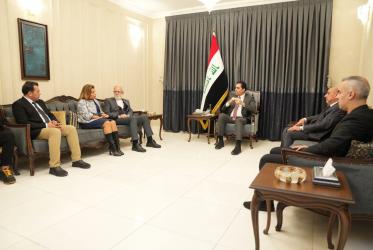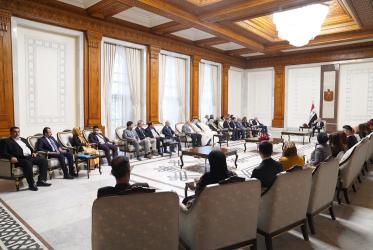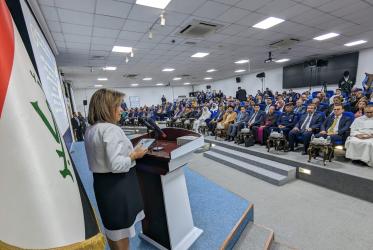Statement from the meeting of European church leaders, convened by the World Council
of Churches in consultation with the Conference of European Churches, the National
Council of Churches of Christ in the USA and the Middle East Council of Churches,
hosted by the Evangelical Church in Germany (EKD) in Berlin, 5 February, 2003
1. As church leaders of Africa, the Americas, Asia, the Caribbean, Europe, the
Middle East, and the Pacific, we remain extremely concerned with the continued
calls for military action against Iraq by the US and some European governments.
As people of faith, our love of neighbour compels us to oppose war
and to seek peaceful resolution of conflicts. As churches we pray for peace and
freedom, justice and safety for the people of Iraq and in the Middle East as a
whole. Such prayer obliges us to be instruments of peace.
2. We deplore the fact that the most powerful nations of this world again regard
war as an acceptable instrument of foreign policy. This creates an international
culture of fear, threat and insecurity.
3. We cannot accept the stated objectives of a war against Iraq, as laid out by
these governments, in particular the US. Pre-emptive military strike and war
as a means to change the regime of a sovereign state are immoral and in violation
of the UN Charter. We appeal to the Security Council to uphold the
principles of the UN Charter which strictly limit the legitimate use of military
force and to refrain from creating negative precedents and lowering the
threshold for using violent means to solve international conflicts.
4. We believe that military force is an inappropriate means to achieve disarmament
of any Iraqi weapons of mass destruction. We insist that the carefully
designed mechanisms of the UN weapons inspections be given the time needed
to complete their work.
5. All UN member states have to comply with binding UN resolutions and
resolve conflicts by peaceful means. Iraq can be no exception. We call on the
Government of Iraq to destroy any weapons of mass destruction and related
research and production facilities. Iraq must cooperate fully with UN weapons
inspectors, and guarantee full respect of the civil and political, economic, social
and cultural human rights for all its citizens. The people in Iraq must be given
hope that there are alternatives to both dictatorship and war.
6. A war would have unacceptable humanitarian consequences, including largescale
displacement of people, the breakdown of state functions, the possibility
of civil war and major unrest in the whole region. The plight of Iraqi children
and the unnecessary deaths of hundreds of thousands of Iraqis over the
past 12 years of sanctions regime weigh heavily on our hearts. In the present
situation, we strongly affirm long-standing humanitarian principles of unconditional
access to people in need.
7. We further caution against the potential social, cultural, and religious as well
as diplomatic long-term consequences of such a war. Further fueling the fires
of violence that are already consuming the region will only exacerbate intense
hatred strengthening extremist ideologies and breeding further global instability
and insecurity. As church leaders we have a moral and pastoral responsibility
to challenge xenophobia in our own countries as well as allay the fears
of many in the Muslim world that the so-called Western Christianity is against
their culture, religion and values. We should seek cooperation for peace, justice
and human dignity.
8. All governments, in particular the members of the Security Council, have the
responsibility to consider the whole complexity of this issue. All peaceful and
diplomatic means to compel Iraq to comply with UN Security Council resolutions
have not been exhausted.
9. For us it is a spiritual obligation, grounded in God's love for all humanity, to
speak out against war in Iraq. Through this message we send a strong sign of
solidarity and support to churches in Iraq, the Middle East and in the USA.
We pray that God will guide those responsible to take decisions based on careful
reflections, moral principles and high legal standards. We invite all churches
to join us in this act of witness and to pray for and encourage participation
of all people in the struggle for a peaceful resolution of this conflict.



